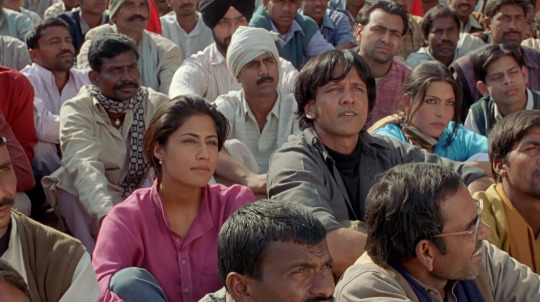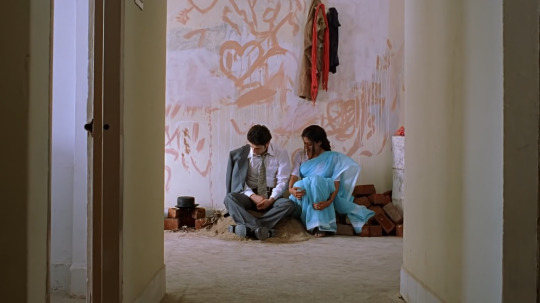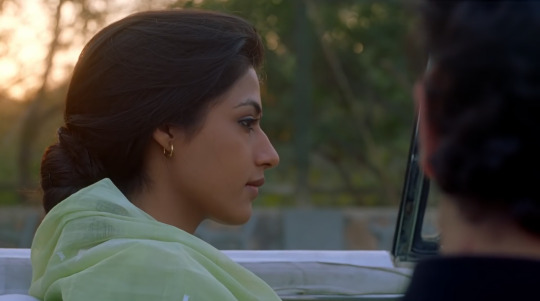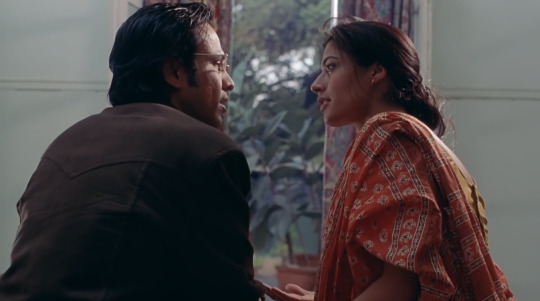all images are borrowed - each frame a moment from someone else's story; I share them only to reflect, not to claim. all credit to the creator.
Don't wanna be here? Send us removal request.
Text










Monkey Man (2024) dir. Dev Patel
"You see scars. I see the courage of a child fighting to save his mother. These are the hands of a warrior, who is destined to challenge the gods. All your life, you've been fighting to feel pain. You need to fight for a purpose. Fight... for all of us. It's time to remember who you are."
Dev Patel's directorial debut bleeds with the fury and exhaustion of the working class. The protagonist isn't just a man seeking justice, he's a symbol of the masses - who are trapped in cycles of labour, humiliation and erasure. And as he moves through the levels of hierarchy ( the levels of the luxurious hotel) to exact his revenge, the people he fights aren't just villains.
A tantric-politican who twists faith into fear and a police officer who protects his power, not people, are the oppressive systems in the flesh. They are the avatars of a state that packages religion and nationalism to mask exploitation. The metaphor isn't subtle by any means, but it's bluntness is exactly what gives it power.
The name, 'Monkey Man', speaks to the colonial and caste-coded dehumanisation of the working class. The protagonist is treated like an animal, caged and commodified, forgetting that in Hindu mythology, Hanuman - the half-man, half-monkey god - is a divine symbol of loyalty and justice. So in an act of narrative justice, the low becomes the holy, as it always deserved to be.
Monkey Man becomes a parable, not of individual vengeance, but of what happens when the oppressed are left with no option, embodying a violence which is not just stylised, but essential for survival. The rage of the working class, the rural population and religious minotirites is unsilenced in an undeniable reckoning that overcomes the wounds of the body and soul caused by systems that want unfeeling and obedient subjects. In such, resistance comes in form of embracing pain, not as a weakness or to glorify it, but as a witness - as a guide.
"The pain will leave you once it’s finished teaching you."
In the end, we see that the oppressed are not powerless - they are just waiting for their moment to rise.
0 notes
Text









Fruitvale Station (2013) dir. Ryan Coogler
"You shot me? I got a daughter."
Tracing the final day of Oscar Grant's life with aching intimacy, Coogler portays a man trying to live, love and begin again. The film encourages new beginnings - from being set on New Years Eve, to letting go of past habits and fixing relationships - the narrative is carried like a train, moving forward, toward renewal, toward a new year, a change.
Yet in a fate all too brutally familiar, Oscar is delivered to the same system that always stood waiting. A system that sees Blackness as danger and makes redemption impossible. A system that was built to fail him, despite his attempts to reclaim control of his life. The train platform becomes his grave - as being Black, unarmed and alive is still not enough to guarantee survival.
The tragedy of the film is that it isn't about him dying - its about him living, fully and tenderly, and still being denied the right to continue. As a eulogy filled with light, happiness and laughter, the film doesn't just mourn Oscar Grant, it mourns the space he should have filled, as the loving father he was becoming and the man he was already.
5 notes
·
View notes
Text








A Prophet (2009) dir. Jacques Audiard
"You just want to use us. So? As long as it's good for everyone."
Though often praised as a gritty, realist masterpiece - a saga that traces the evolution of a voiceless Arab prisoner to a figure of quiet power - beneath the stylistic brilliances lies a deeper discomfort; the film never quite escapes the outsider's lens.
While Malik is the film's protagonist, he's not fully given interiority - he's shaped by violence, used by systems, and watched by the camera with a kind of cold fascination. Arab and Muslim identiy in the film is never explored in its own terms. Which is why it is no surprise that Malik becomes powerful not by reclaiming his own heritage, but by navigating and eventually mimicking the tools of his opressors.
Arabness is appropriated and Islam only appears in half-baked gestures. Malik's spiritual life is muted, as his growth is not measured in soul, but in strategy. The film positied Malik as both other and object - sympathetic, but not self-defined. It perfectly plays into the textbook defintion of Orientalism.
In the end, A Prophet tells a compelling story - but from a distance. And while the result may be cinematically stunning, it doesn't ask what it means to be Arab in the West, but instead uses those identities to build myth, to project meaning. However, considering the backlash from Audiard's Emilia Pérez (2024) alleging the trivialisation of Mexico's war on organised crime, this clearly was not his last rodeo on the appropriation train.
0 notes
Text










Sinners (2025) dir. Ryan Coogler
"You keep dancing with the devil, one day he's gonna follow you home."
Sinners is a hymn soaked in blood and memory. When Smoke and Stack, twin sons from a broken place, return to open up a juke joint, what pours out of it is not just music. It’s everything they’ve buried - hunger, pride and loss. Set in 1930's Mississippi, the film moves like a Blues line stretched across generations.
Coogler echoes a truth carved deep into Black history. A truth that music was never just music. It was worship, but also rebellion and survival. In Sinners, it's also a battleground, as the vampires don't just feed, they perform - just like humans do. The difference, however, is the cost of salvation - the price of mortality and their soul.
8 notes
·
View notes
Text








Thunderbolts* (2025) dir. Jake Schreier
"The past doesn't go away. So you can either live with it forever, or do something about it."
Thunderbolts* feels like a requiem for the forgotten. Not a thunderous Marvel epic, but a slow-burn elegy for the broken masks and quiet grief behind the armour. They're all running - from guilt, from shame, from what they've done and what they weren't strong enough to do.
The film drips with a grey kind of hope. The kind that doesn't rise with a music swell, but crawls into your chest and quietly sits there, casting a long shadow. It's not polished, it's raw - like old wounds healing in the dark. And there are many fights, but the real violence happens inside, where traumatic memories hit harder than any punch.
As a superhero film that is less about being a hero and more about what it means to be scarred and hollow and still try to become something better - someone better - it is perhaps the bravest thing Marvel has done.
10 notes
·
View notes
Text










Guddi (1971) dir. Hrishikesh Mukherjee
“You can think of nothing except movies!”
Guddi (Kusum, played by Jaya Bachchan) isn’t just in love with the star studded Dharmendra. Like many of us, she’s in love with the idea that life could be as beautiful, as kind, as scripted as the films she watches under the soft hush and comfort of the cinema hall.
Mukherjee gently pulls back the curtain for Guddi, inviting the audience into a more tender, grounded truth of the difference between performance and reality. The film honours her longing as real, even as it teaches her the limits of fantasy. But slowly, through studio visits, behind the scenes glimpses of production and quiet wisdom of those in show business, the glamour of the silver screen is dismantled.
Girlhood itself is unravelled, as much like cinema, it is a space where dreams bloom without shame. Where imagination is pure and excessive, and where disillusionment, when it comes, is both painful and necessary. For Guddi, cinema becomes both the illusion and the cure. It breaks her heart, but then helps her see the beauty of the love around her.
Even today, Guddi feels fresh. In an age where celebrity worship has only deepened, it asks: what does it mean to fall in love with an image? And how do we return to ourselves once we do?
0 notes
Text




A Real Pain (2024) dir. Jesse Eisenberg
"You light up a room and then you shit on everything inside it."
For its ability to intertwine humour with grief and pain, A Real Pain offers a fresh perspective on the Holocaust's enduring impact on subsequent generations.
As a portrait of grief, both past and present, the film paints what we inherit and what we choose to carry. How sometimes, healing doesn’t look like closure - it looks like sitting in an airport, too tired to move, but not quite ready to go home. Kieran Culkin's Oscar-winning performance as Benji is representative of this grief that refuses. Refuses to be polite and manageable and refuses to return.
As Benji waits in the airport, in an emotionally jet-lagged limbo, he waits for the world to make sense again - even if it never will.
10 notes
·
View notes
Text


Something Sweet (2022) dir. Nuhash Humayun
(2/4 Pett Kata Shaw)
A forgetful sweet shop owner Mahmud (Chanchal Chowdhury), encounters a jinn with a sweet tooth who grants him the ability to remember everything. But the weight of every memory, sweet and bitter, can be overwhelming.
From cricket matches, to childhood bullies to the trauma of childbirth, memories that overwhelm, are an eternal return. An endless loop of the past that offers no comfort and where every wound stays fresh. Even the sweetest moments rot under the weight of what they cannot undo.
Because to remember everything is to never forgive, to never heal. And that, Humayun makes clear, is a fate worse than forgetting.
0 notes
Text








Ishtar (1987) dir. Elaine May
"Why didn't you recruit me as a communist? Wasn't I good enough?"
At the heart of this strange, offbeat satire disguised as a buddy comedy which is often (unfairly) remembered more for its disastrous box office than for what its actually trying to do, is a biting critque of Western interference in the Middle East.
As painfully untalented the lounge singers (played by Dustin Hoffman and Warren Beatty) are, the film plays into their strange earnestness. It leans into its absurdity through deliberately awkward songs, misplaced idealism and American cluenessless. But eventually as the fictional Ishtar gets caught between a brutal regime and a resistance movement (both manipulated by the CIA), so do the clueless Americans - mirroring a foreign policy that promises protection but delivers confusion, danger, and betrayal, failing not just distant nations, but the very fools who serve the policy in the first place.
However, using the language of slapstick to expose the violence of American foreign policy in all of its farce and arrogrance and exported chaos was probably too much for the audience at the time. It was likely too smart to be loud and too weird to be safe.
But perhaps the most impressive punchline of the film, is the fact that much of it still remains true, almost 40 years on, as the comedy of American blunders abroad are underwritten by real consequences. Clearly, empires rarely learn from the messes they leave behind.
1 note
·
View note
Text




Women Are not Allowed in this Building (2022) dir. Nuhash Humayun
“Danger ahead? When you see it, look it in the eye. Conquer the fear. And beware - don’t turn your back. Hunger has no patience for cowardice.”
(1/4 Pett Kata Shaw)
Inaugurating the horror anthology series Pett Kata Shaw (trans. ‘stomach cut open’), Humayun evocatively explores the Bengali folklore of witches who are drawn to the scent of cooking fish.
Tucked inside a dim-lit apartment and fish-scented silence, is a parable about patriarchy, control, and the haunting of everyday life. The building, strict and male-only, becomes its own kind of grave - or so we think.
The witch doesn’t burst in - she arrives quietly, calmly, with the entitlement of someone who’s been wronged by centuries. She is not chaos. She is consequence. And thus, the young man becomes the axis of an old world collapsing under the weight of its own fear.
The young man, Hasan, played by Shohel Mondol, repeats a rule his mother instilled in him - “don’t turn your back” - in order to survive. As the witch is a figure born from pain, exile, and betrayal, turning your back on her isn’t just about physical vulnerability - it’s symbolic. It’s denial. It’s choosing ignorance when you’ve already been warned. To turn away is to repeat the harm. To pretend she isn’t there is to guarantee she’ll never leave.
Fish in Bengali culture is more than food, drawing upon tradition, identity and even ritual. It’s tied to femininity, nourishment, fertility. The act of cooking it is intimate, homely. So when a witch - usually imagined as a woman wronged, cast out, widowed, or buried without peace - is drawn to that smell, it’s not just hunger. It’s longing.
So, the witch enters not to destroy, but to reclaim - food, presence, vengeance, memory. She is history - a woman who comes back because she was never allowed to stay. And fish, simple and sacred, is what calls her home. But also - who doesn’t love the smell of fish curry?
1 note
·
View note
Text








Double Happiness (1994) dir. Mina Shum
“Double happiness is when you make yourself happy and everyone else happy too.”
Sandra Oh’s Jade searches for ‘double happiness’ - the perfect balance between personal fulfilment and familial harmony - an ideal that every child caught between cultures grows up believing.
But the double in Double Happiness is not abundance, it’s a division. A life split down the middle - a double life that meanders between obedience and choice. Just as how Jade, an aspiring actress, has played the role of obedient daughter her whole life, but in the mirror, she practices being someone else entirely - someone who is always bold and braver. The characters Jade practices being are fragments of her imagined freedom - versions of herself untethered from guilt, fluent in desire, unafraid to speak.
In a poignant scene, Jade is confronted in an audition, unable to read lines written in Chinese. This failure is loaded. Rather than a test of talent, the audition becomes a test of belonging - and she does not pass.
This turning point speaks to the dislocation of growing up between languages, between expectations. Jade, like many, is unscripted. So the silence in that room becomes its own truth: she cannot read the lines because they were never written for her.
The rest of her story she paves herself, refusing to be a ghost in her own life. But in choosing herself, Jade doesn’t abandon her family - she just refuses to disappear within them. And that, in the world she’s come from, is its own kind of rebellion; tender, painful, but necessary.
1 note
·
View note
Text












Umrao Jaan (1981) dir. Muzaffar Ali
"What is the heart? Take my life instead."
Umrao (Rekha) is not just a tawaif, she is the archive of a vanishing culture and history. As colonial modernity creeps through the corridors of Lucknow (and Indian Cinema), the world of the tawaif begins to dim. Once touchbearers of culture and the ultimate quadruple threat - poetry, music, dance, ettiquette - women like Umrao are slowly stripped of dignity and left only with performance, which the film certainly makes clear.
Her body is like colonised ground, writing herself into history through poetry, her voice a rebellion, as she eventually refuses to be rescued by love or redeemed by respectability. When nawabs fail her, when society forgets her, she survives only by her own grace.
Umrao's tragedy is not that she is lost - it is that the world changed, and left no place for women like her to belong. And yet, her story endures, like her ghazals - wounded but radiant and unbroken.
2 notes
·
View notes
Text








Paris Blues (1961) dir. Martin Ritt
"Here, nobody says, "Eddie Cook, negro musician." They say, "Eddie Cook, musician," period. And that's all I want to be."
The film sets itself up with all the ingredients for something radical; Sidney Poiter as a Black jazz musician finding freedom in a city that doesn't police his skin the way America does and a soundtrack that pulses with Black artistic brilliance, courtesy of Aaron Bridgers and Louis Armstrong.
However, it falls short of its potential. Though touching on issues of race and artistic integrity, it has a tendency of retreating into safer narrative choices, perhaps reflective of the era's constraints.
What does freedom mean for a Black artist abroad? How does love challenge prejudice? - the film never fully commits to these questions, instead orbiting around its white characters. The arc of Newman's Ram overshadows Poiter's character, Eddie Cook, who was the main protagonist of the original novel, and who arguably has the more urgent, politically charged story. As his avoidance of the racial violence and humiliation of America is challenged by Connie (played by Diahann Caroll), who is grounded in the struggle for civil rights, love overcomes his peace in exile.
Yet the Paris Blues struggles, perhaps unable to fully imagine a Black man's emotional life as equal to a white man's artistic crisis.
1 note
·
View note
Text



Dearest Father by Franz Kafka (trans. by Hannah and Richard Stokes)
"That was merely the beginning of things, but this feeling of powerlessness which still regularly overcomes me (in other respects admittedly a noble and productive feeling) stems in many ways from how you treated me. What I needed was a little encouragement, a little friendliness, a little help to keep my future open, instead you obstructed it, admittedly with the good intention of persuading me to go down a different path. But I was not fit for the path you chose."
Modern European literature is full of sons trying to write their way out from under their fathers - Kafka's Letter to His Father sits at the very heart of this tradition.
In a 47 page letter to his father, Kafka turns a wound into language. In a raw, trembling attempt, Kafka explains himself to a man who never truly saw him. He puts into words the weight he's carried his whole life, reckoning with power, fear, masculinity and emotional inheritance.
Thus Kafka's entire literary works are framed as an attempt to process, resist, or rewrite his father's law. The figures of inaccessible authorities in his fiction are all echoes of his father, Hermann Kafka:
"My writing was all about you; all I did there was to lament what I could not lament on your shoulder."
Writing allowed him to escape, even if only on paper:
"In my writing, and in everything connected with it, I have made little attempts at independence, attempts at escape, with the smallest imaginable success; they will scarcely lead anywhere; this has been confirmed many times for me."
What's striking is how Kafka avoids outright condemnation. He repeatedly denies accusing his father, and in some sense, he doesn't. Rather he’s trying to understand how things went wrong, not just that they did. But in trying to be fair, Kafka also ends up indicting himself—labeling himself weak, cowardly, inadequate. This internalisation of blame is part of the tragedy. Even in a letter meant to explain himself, he still assumes he’ll never be truly understood. He isn't just haunted by his father's judgement, in the end he believed it.
Literature doesn't offer Kafka a solution. The letter is not a cry for justice or even for love - but for recognition. It asks "do you see me?" even if the answer is no.
1 note
·
View note
Text









Monsoon Wedding (2001) dir. Mira Nair
"These are my children, and I will protect them from myself even if I have to."
Set in the lead-up to an arranged marriage in a large Delhi household, it feels, on the surface, like a typical Bollywood wedding film. But beyond the chaotic mise en scène lush with marigold, lies a story centering class, patriarchy, migration and memory. Clearly, secrets rise with the monsoon.
Nair gifts the audience with perfectly flawed characters who are sometimes complicit, but often times broken. Yet even within the margins of this grand film, Nair somehow manages to make space for love in unexpected and radical places, especially between a domestic worker, Alice (Tilotama Shome) and Dubey, the wedding planner played by Vijay Raaz.
Shefali Shah's Ria in particular, becomes the axis of the film's integrity as her courage in exposing abuse rightfully disrupts and unravels generations of complicity and silence. In a genre that reduces its female characters to brides or mothers, Ria is an outlier, who is just, herself. Without seeking validation through a male gaze, she is not waiting to be chosen or redeemed - her dignity is internal. And this on its own is enough - to serve justice and confront the hypocrisy of households that mark progress through wealth and honour and not in how they protect the vulnerable amongst them.



Like the monsoon season, the film arrives slowly, and then, all at once. It becomes a reckoning with the past and with inherited systems that demand obedience. But it also delightfully encompasses what survives that reckoning - love and joy - and families that fracture but still choose to hold.
As the rain forces everything to the surface, Monsoon Wedding leaves behind a changed world. Not perfect nor fixed, but cleaner and somehow, honest.
0 notes
Text










A Thousand Desires Like These ('Hazaaron Khwaishein Aisi') (2003) dir. Sudhir Mishra
“Hazaaron khwaishein aisi ke har khwahish pe dam nikle, Bahut niklay mere arman, lekin phir bhi kam nikle...”
"A thousand desires (within me), such that each one seems worth dying for, Many desires have been fulfilled, yet I yearn for many more..."
Mishra provides an autopsy of a nation caught between radical hope and brutal state repression within post-independent India's failed promises. Set in the early 1970s, just before and during the Emergency, it maps the disillusionment of a generation raised on Nehruvian idealism but crushed by Realpolitk and auhtoritarian consolidation.
But at its core, the film portrays the collision between dreams and power, threading the personal into the political. Siddharth the revolutionary, Geeta the idealist and Vikram the pragmatist, are all caught within their own desires. Whether longing for liberation, meaning, or connection, they all face systems that are too entrenched, violent or indifferent to move. The title, pulled from Ghalib's couplet, becomes a haunting refrain. Theirs are just the few of the many thousand desires that are left half-formed, half buried.
Chitrangda Singh's Geeta is the film's moral axis and arguably presents the most durable politics. Her desire - for justice, for purpose - is not an extension of her love for Siddharth, as she stays long after he disappears. As a victim of gendered violence, Geeta sees the movement as a responsibility. Instead of fighting for glory, she fights for people, for the rural women she teaches literacy to, and for children - who like her own - deserve better upbringings.



In the end, the film is not about the triumph of any ideology, but rather the cost of dreaming in a broken state. The thousand desires remain, but the state remains untouched, its violence mutating and surviving. The revolution is dettered.
But perhaps there is one ideology that prevails, or at the very least, survives; love.
1 note
·
View note
Text






Anuja (2024) dir. Adam J. Graves
"So you make something out of nothing?"
Like a thread pulled gently from the seam of childhood, Anuja reveals the labour, loss and longing stitched within the lives of underprivileged children. Stitching clothes to make a living, Anuja and her sister, Palak, weave themselves into a world that rarely lets girls like them dream. So when the opportunity of boarding school arises, for Anuja, it comes in the face of leaving her sister, her labour, her world.
The film bears witness to the invisible threats that bind survival to sacrifice. Without pretending that education is a simple escape, it exposes the limits of access narratives that frame education as universally empowering by accounting for the material conditions that shape the terms of that access. What kind of justice is education if it requires the undoing of kinship in order to be pursued? And what happens if the exam fee is too costly of a price in the first place?
Nonetheless, resistance is woven in fabric form through the bags Palak stitches using extra fabric from the factory, in order to raise money for the exam. In a rebellion done quietly and lovingly, the act of reclaiming tools and using them for themselves becomes a form of resitution within a capitalist system that exploits their labour. The very skills that capitalism profits from are reappropriated by these girls, as they turn inwards, towards education, towards self.
Education is presented as not a promise, but rather a question - alongside the rare, flickering light of social mobility. We realise that Anuja and Palak are owed more than survival, and they will claim it one way or another.
1 note
·
View note